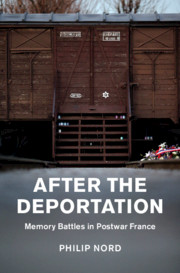Book contents
- After the Deportation
- Studies in the Social and Cultural History of Modern Warfare
- After the Deportation
- Copyright page
- Dedication
- Contents
- Figures
- Acknowledgments
- Abbreviations
- Introduction
- Part I Heroes and Martyrs
- Part II Shoah
- 7 Holocaust
- 8 The Teaching of Contempt
- 9 Witnesses
- 10 Generation
- 11 “The Return of the Repressed”
- 12 Shoah
- Epilogue and Conclusion
- Notes
- Index
10 - Generation
from Part II - Shoah
Published online by Cambridge University Press: 16 November 2020
- After the Deportation
- Studies in the Social and Cultural History of Modern Warfare
- After the Deportation
- Copyright page
- Dedication
- Contents
- Figures
- Acknowledgments
- Abbreviations
- Introduction
- Part I Heroes and Martyrs
- Part II Shoah
- 7 Holocaust
- 8 The Teaching of Contempt
- 9 Witnesses
- 10 Generation
- 11 “The Return of the Repressed”
- 12 Shoah
- Epilogue and Conclusion
- Notes
- Index
Summary
The Arab-Israeli war of 1967 is another oft-cited turning point, but I want to emphasize generational shift instead. The mere mention of generation in this context brings 1968 to mind, and that’s correct so long as 1968 is understood in broad terms to include not just the events of May but something more encompassing: an era when the received truths of the postwar order were called into question and cut down to size. The era of ’68, so defined, was consequential for Holocaust consciousness in three respects. The first has to do with the fate of the epic stories, Gaullist and communist, that had once enjoyed pride of place in postwar public consciousness. Sixty-eighters, “mirror-breakers” that they were, set about detonating these grand narratives. They were aided in the task by that past-master of iconoclasm, the documentarist Marcel Ophuls, who released two classics of cinematic debunking in these years dealing the legacy of the war: Le Chagrin et la pitié (1969) and Memory of Justice (1976). As old stories were ushered out, a Jewish story entered in, thanks in part to savvy use of the media. Sixty-eighters were adept at staging events that concentrated the public’s attention, a tactic that militants of Jewish memory made a conscious and successful bid to imitate, none more so than the husband-and-wife team of Serge and Beate Klarsfeld. 1968 mattered in a third and final sense, having to do less with the May events proper than with their aftermath, that is, with the fading of Marxist enthusiasms once the Revolution so many sixty-eighters had hoped for failed to materialize. From left-wing disillusionment was born a turn to identity politics, and for young French Jews, coming to terms with what Jewishness meant in France entailed willy-nilly a coming to terms with France’s own role in the Final Solution. As that role was brought into focus, so too did a new memorial map take shape, a Jewish one with its own high places of memory: the Vél d’hiv bicycle stadium where Jews, rounded up by Vichy police in 1942, had been detained; the Drancy transit camp in the suburbs of Paris where they were held prior to deportation; and Izieu (near Lyon), the site of a Jewish children’s home whose teachers and students were sent to their deaths by the Lyon Gestapo chief, Klaus Barbie.
- Type
- Chapter
- Information
- After the DeportationMemory Battles in Postwar France, pp. 308 - 338Publisher: Cambridge University PressPrint publication year: 2020



